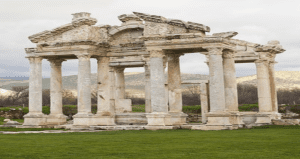
Regardless of one’s religious or secular beliefs, it must be admitted that human beings are social animals and seek to live in societies. Said differently, any discussion on society begins with the presupposition that humans are naturally social.
Accepting the social nature of human beings, the question becomes what constitutes the ideal or best society for humans to live in. In this paper, I will suggest that any healthy civilization must be based on Catholic principles.
Most will agree that the current state of our civilization is far from ideal. Indeed, one could argue that we are witnessing the collapse of Western society. Now, more than ever, our civilization is in need of being saved, and Catholicism has saved civilization before. To see how, we must travel back to approximately the end of the Roman Empire, around the year 476.
In the years following the collapse of the Roman Empire, the world fell into what some have called the Dark Ages. It was a time marked by economic and cultural decline, if not collapse. Perhaps most ominous was the potential loss of intellectual treasure built up over the preceding years. Indeed, many of the ancient texts on science, literature, and religion would not be available today if not for the Catholic Church.
Monasteries served as centers of learning and had extensive libraries. Monks diligently copied and preserved many of the great works produced to that time, and scribes meticulously transcribed and illuminated texts by hand, ensuring their preservation for future generations. This process allowed for the replication of essential works.
The Catholic Church supported and patronaged individuals, encouraging them to pursue their studies. Many scholars, such as Thomas Aquinas and Roger Bacon, were sponsored by the Church, allowing them to contribute to advancing knowledge in various fields.
Moreover, much of what we consider the modern university system is indebted to Catholicism. It was the Church that established universities and schools throughout Europe. These institutions provided education to both clergy and laypeople, ensuring the transmission of knowledge across generations. Prominent universities, such as the University of Paris and the University of Bologna, became centers of intellectual activity. Therefore, it is not, I think, an understatement to say that what today we consider Western Civilization exists because of the work of the Catholic Church.
Using the above as a point of departure, one must ask whether contemporary society is once again in need of rescue. While it is difficult to compare the current state of Western Civilization with its condition at the end of the Roman Empire, it is possible to identify aspects of our society that would benefit from an infusion of Catholicism.
It is impossible in the space available to go into depth regarding the component parts of society and how they may be benefited by Catholic thought. Therefore, I will limit myself to four topics: religion, government, justice, and art.
Of course, Catholics believe that theirs is the true faith. However, living in pluralistic societies that predominate Western cultures, it is necessary to adopt a policy of religious freedom that allows for the practice of other faiths. Religious freedom means individuals, families, communities, and institutions are allowed to live out religious convictions.
The Catholic faith is not entirely a private matter, however. Indeed, I suggest that an infusion of Catholic principles would greatly benefit the government at various levels. I am in no way arguing for a theocracy, only that certain aspects of Catholic thought, such as the recognition of natural law and the dignity of all life, be given a greater voice in the public forum.
Similarly, Catholicism ought to inform the culture’s understanding of justice. From a philosophical and Catholic perspective, justice is a moral quality or habit that perfects the will and inclines it to render to each and to all what belongs to them. Two principles, subsidiarity and solidarity, provide the foundation for justice from the Catholic perspective.
Subsidiarity refers to the teaching according to which a community of a higher order is prohibited from interfering in the internal life of a community of a lower order, depriving the latter of its functions, but rather should support it in case of need. Said differently, matters that can adequately be handled by local jurisdictions should be free from interference from the state or federal authorities.
Balancing subsidiarity is the principle of solidarity. Solidarity is the teaching that whatever our national, racial, ethnic, economic, and ideological differences, humans are all made in the image of God. The claim that human beings are made in the image of God provides a point of departure for developing policies and practices that promote peace and justice.
The last topic I will discuss is art. The nature of art makes defining it difficult. Making matters more complicated, modernity has so expanded any definition of art that the discipline can encompass almost anything.
Historically, art was considered memetic; that is, art sought to imitate objective reality. Modernity, however, tends to deny the existence of a reality independent of the individual. Think, for example, Immanuel Kant’s theory that mind creates reality. From a Catholic perspective, art should reveal something about the nature of objective reality. It should allow us to see God’s creation in a multitude of ways.
Finally, art is, or at least should be, an expression of beauty. We frequently hear that beauty is in the eye of the beholder. It seems to me that the question is who is doing the beholding. If it is understood strictly from the perspective of the individual, then beauty is subjective. However, if beauty is that which is pleasing to God, then we have an objective standard by which we can judge art.
The above exposition in no way exhausts Catholic teachings or society’s needs. Rather, I have endeavored to provide a brief sketch of ways in which Catholic thought can improve Western civilization.













